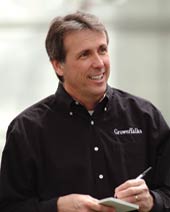3/15/2009
Thirty Years Ago
Chris Beytes

It’s a sad but true fact that some of you who are reading this today won’t be in business to read my April 2039 Acres & Acres column. I base that earth-shattering statement on a recent trip back in time that I took, courtesy of the
GrowerTalks’ archives.
The
GT library is one of the benefits of being the editor of a 72-year-old magazine. Whenever I please, I can pull a leather-bound year of
GrowerTalks from the shelf and read about what was happening in our industry anytime since 1937—who was growing what, and how, and what the latest technological trends were, new glasshouse ranges, the political buzz, global concerns, energy … you name it, it was in there.
Most fun for me though is seeing the names and photos of familiar people and places. Chesapeake, Virginia, pot plant grower Norm White has been a regular, thanks to his friendship with Vic Ball. Other names that pop up over the years include Bachman, Clesen, Corso, Van Wingerden, Kurtz, Leider and Kitayama. Places make repeat appearances, too—Long Island, Cleveland, Carpinteria, Milwaukee, St. Louis. George and Vic and Carl covered the globe, but they had their favorites locally.
Recently, out of curiosity, I decided to pull the 1979
GrowerTalks and list every greenhouse business mentioned that year. I found 111 nurseries. Some were identified clearly, such as Hicks Nursery, Westbury, New York; and MV Nurseries, Richmond, California (now Color Spot). Others, sometimes just a name, were unfamiliar to me, like “Don Bradley, Elmira” and “Noji’s, Seattle.”
Which got me to wondering … How many of the businesses mentioned in 1979 are still in business today? Thanks to the magic of Google, I was able to check.
Of the 111 businesses named, at least 77 (69%) are still in business today. That’s more than two-thirds, which I believe is a pretty good statistic for small businesses.
Of those, some have changed hands (like Baker Greenhouses in Utica, New York, which was bought by Hines and then Kurt Weiss) or changed direction (few, if any, of the cut flower growers mentioned, such as Dillon Floral and Hermes Floral, still grow their own roses—although Dillon does do specialty cuts).
Out of the remaining 34, there are only five that I can say for sure are no longer with us, such as Geneva Flower Farm, which closed a few years ago (I have a door from their old greenhouse in my basement). And Oakdell, of Apopka, Florida. That was Weyerhaeuser’s attempt at our industry, after they bought Oakdell from founder Jack Christmas in 1976. That greenhouse was later sold to Gene and Arlis Greiling (Natural Beauty) who sold it to Canada’s Fernlea of Canada (who also got a mention in 1979), who sold it to Kerry Herndon. So while Oakdell the business is long gone, Jack Christmas’s greenhouse lives on.
Some names are mysteries. Dixie Greenhouses in Greenville, South Carolina? E.C. Wagner of Beaver Falls, Pennsylvania? Laubinger’s of Cleveland? Milwaukee Greenhouse? P.J. Yeatman of Kennett Square? Deys of St. Paul? Concord Roses of Ontario? Any of you still around?
We tend to view business closings as a tragedy—a sign of the “demise” of our industry. But is it really? According to an Australian study of more than 5,000 startup businesses over 29 years cited in Business Week, 64.2% of the businesses “failed” within a 10-year period—if failure was measured as “discontinuance of ownership”—but only 5.3% of them actually filed for bankruptcy. In other words, plenty of people choose to close their businesses, and often for good reasons.
In our industry, many people sell because they have no kin to take the reins. Others sell to fund their retirement or a new challenge. Yes, some find the going too tough … but in those cases the greenhouse most often goes to a new owner, like Kerry Herndon in the venerable old Oakdell facility.
The way time flies, it won’t be long before I’m writing the 2039
GrowerTalks. I think I’ll go back to 2009 and see how many of you are still around.
(For the complete list of growers mentioned in 1979, go to www.growertalks.com/1979)